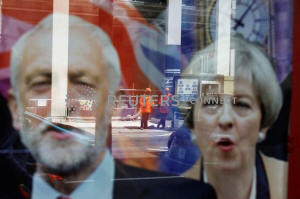|
Labour declares Brexit talks dead as
May's premiership crumbles
 Send a link to a friend
Send a link to a friend
 [May 17, 2019]
By Guy Faulconbridge and Andrew MacAskill [May 17, 2019]
By Guy Faulconbridge and Andrew MacAskill
LONDON (Reuters) - Britain's tumultuous
divorce from the European Union was again in disarray on Friday as the
opposition Labour Party declared last-ditch cross-party talks dead as
Prime Minister Theresa May's premiership crumbled.
Nearly three years after the United Kingdom voted 52% to 48% in a
referendum to leave the EU, it is still unclear how, when or if it will
ever leave the European club it joined in 1973. The current deadline to
leave is Oct. 31.
Brexit talks between May's Conservative Party and Labour collapsed hours
after May agreed on Thursday to set out a timetable for her departure in
early June.
Labour leader Jeremy Corbyn wrote to May on Friday informing her that
the Brexit talks, which began on April 3, had "gone as far as they can"
due to the instability of her government.
"We have been unable to bridge important policy gaps between us," Corbyn,
a socialist who voted against joining the predecessor of the EU in 1975,
wrote to May.
"Even more crucially, the increasing weakness and instability of your
government means there cannot be confidence in securing whatever might
be agreed between us," Corbyn said.

He said Labour would oppose May's deal when it returns to parliament
early next month.
The divorce deal, which May agreed last year with the EU, has already
been rejected three times by a deeply divided parliament.
The pound sank to $1.275, its lowest level since mid-January.
May's hands have been tied, knowing that to make concessions to Labour
would lead to fury in her divided party. Labour has feared any
compromises on issues such as workers' rights would be torn up by May's
successor.
Britain’s labyrinthine crisis over Brexit has stunned allies and foes
alike, and with deadlock in London, the world's fifth largest economy
faces an array of options including an exit with a deal to smooth the
transition, a no-deal exit, an election or a second referendum.
The Brexit impasse is unlikely to be broken swiftly.
May will put her 'European Union (Withdrawal Agreement) Bill' to a vote
in parliament in early June even though rebels in her party have pledged
to defeat it. Then she must agree a timetable for the election of a
successor.
[to top of second column]
|

Workers in protective equipment are reflected in the window of a
betting shop with a display inviting customers to place bets on tbe
result of the general election with images of Britain's Prime
Minister Theresa May and opposition Labour Party leader Jeremy
Corbyn, in London, June 7, 2017. REUTERS/Marko Djurica

MAY ENDS IN JUNE
Boris Johnson, the face of the campaign for Britain to leave the EU,
said he would be standing as a candidate to replace May as
Conservative leader.
"Tories must go with Boris Johnson if they want to survive or
they’ll end up as dead as a dodo," Sun newspaper columnist Trevor
Kavanagh said. "Even sopping wet Remainers can see the writing on
the wall and want Theresa May out as fast as possible."
The winner of a leadership contest will automatically become prime
minister and will take control of the Brexit process, which has
plunged Britain into its worst political crisis since World War Two.
Johnson has been one of May's most outspoken critics over Brexit and
supports leaving the EU without a deal. Parliament has repeatedly
said it does not want a no-deal Brexit.
The Brexit crisis has left the United Kingdom divided and smaller
parties - such as Nigel Farage's Brexit Party and the pro-EU Liberal
Democrats - are poaching support from both the Conservative and
Labour parties at the fastest rate for decades.
"Britain is divided down the middle over Brexit: it was in 2016 and
it is in 2019 - and that is one of the reasons why this issue is so
difficult to resolve," John Curtice, Britain's top polling expert,
told Reuters.
"We are also polarised: Most Leavers would prefer to leave without a
deal and most Remainers want a second referendum in the hope we
shall change our minds, and there isn't an awful lot of support for
any of the compromise options between those extremes."

(Writing by Guy Faulconbridge; Editing by Janet Lawrence)
[© 2019 Thomson Reuters. All rights
reserved.]
Copyright 2019 Reuters. All rights reserved. This material may not be published,
broadcast, rewritten or redistributed.
Thompson Reuters is solely responsible for this content. |